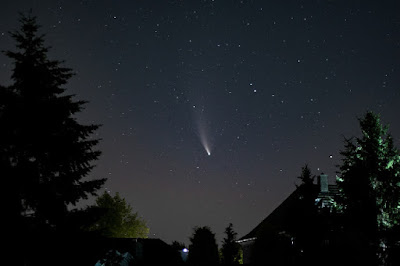Comets, the Young Solar System, and Secular Rescuing Devices
Whenever there is a noticeable celestial object in the night sky, people tend to make efforts to see it. As well they should. Annual meteor showers are interesting. Comets, however, garner more attention, possibly because they are less common. Have you ever stopped to consider them?
F'rinstance, comet C/2020 F3 (NEOWISE) was discovered, and was eventually close enough to be seen with the naked eye. (By the way, it's thought that those annual meteor showers are from the debris of comets.) Comets can only last with an upper limit of 10,000 years, which is far too small to fit old solar system narratives. Various rescuing devices are concocted using the principle of Making Things Up™ and then passed along as science.
So, they have to be replenished. One of the alleged sources for comets is the Oort cloud, which has no observational evidence and the concept is self-refuting; it can't work. (One jasper with Atheism Spectrum Disorder declared that Voyager 1 actually passed through it, but that is utterly false.) Other areas of replenishment are out past the orbit of Neptune, but those fail as well. Gotta keep that cosmic evolution story propped up, you know. The truth is that the universe is not anywhere near as old as secularists wish, and comets give mute but often bright testimony to this.
 |
| Credit: Unsplash / Tim Dennert |
So, they have to be replenished. One of the alleged sources for comets is the Oort cloud, which has no observational evidence and the concept is self-refuting; it can't work. (One jasper with Atheism Spectrum Disorder declared that Voyager 1 actually passed through it, but that is utterly false.) Other areas of replenishment are out past the orbit of Neptune, but those fail as well. Gotta keep that cosmic evolution story propped up, you know. The truth is that the universe is not anywhere near as old as secularists wish, and comets give mute but often bright testimony to this.
To read the full article, click on "Comets: Signs of Youth".Although comets are known for their long, beautiful tails, a tail isn’t necessary for an object to be a comet. Comets are defined as solar system bodies that have at least a temporary visible atmosphere, or coma, even if a tail isn’t present.Comets are comparatively small, with typical diameters of about 10 kilometers (six miles). They are composed of a mixture of rock, dust, and frozen ices, including water ice, and have been described as “dirty snowballs.